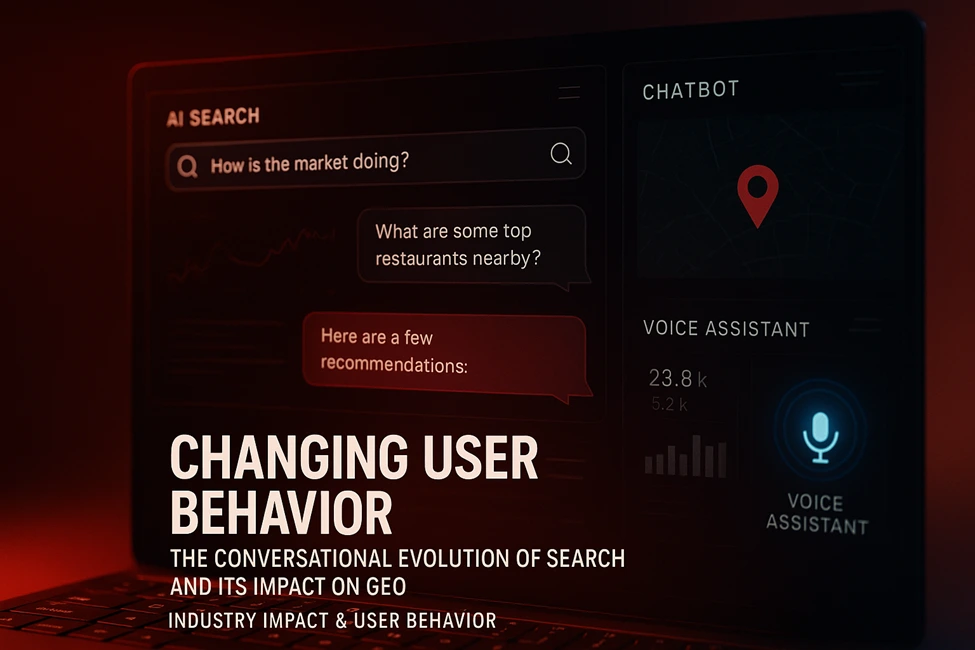Changing User Behavior: The Conversational Evolution of Search and Its Impact on GEO | Industry Impact & User Behavior

Think about the last time you searched for something on your phone. Did you type in short, broken keywords like “best restaurant Mumbai”? Or did you ask a whole question, either by typing or by voice, like, “Hey Google, where can I get the best seafood biryani near me that’s open now?”
If you did the latter, you’re part of a massive global shift. We’ve stopped talking at search engines and started having conversations with them. We treat them less like a clunky computer and more like an intelligent, all-knowing personal assistant. This change from simple keywords to complex conversations isn’t just a cool new feature; it’s a fundamental revolution in how people find information and, more importantly, how they find local businesses like yours.
This evolution is powered by incredibly advanced Artificial Intelligence (AI). And for businesses still playing by the old rules of SEO, this change can be terrifying. But for those who understand it, this conversational shift presents the single most significant opportunity to connect with high-intent customers in your local area. In this article, we’ll break down exactly how this change happened, what it means for your business, and how our GEO Execution strategy is designed to help you win in this new conversational world.
The Big Shift: From Typing Keywords to Having a Conversation
To understand where we are, we need to see how far we’ve come. The way we interact with search engines has gone through a dramatic transformation.
The "Old Way": A World of Keywords
Not too long ago, search engines were fairly basic. They worked by matching the exact words you typed into the search bar with the words on a webpage. To get found, businesses had to guess the exact keywords customers might use and replicate them over and over on their website, a practice called "keyword stuffing". The entire process felt robotic because we were essentially trying to speak a machine’s language. We chopped up our natural questions into short, awkward phrases, hoping the machine would understand.
The "New Way": Talking to a Smart Assistant
Today, thanks to voice assistants like Google Assistant and Siri, and the overall improvement in search technology, we search the way we speak. We ask long, detailed, and conversational questions. We don’t just search for “AC repair Delhi”; we ask, “ Which company offers same-day AC repair in South Delhi for a 1.5-ton split unit?”
This isn't just a trend; it's a complete change in user behavior. People expect immediate, accurate, and precise answers to their complex questions. They expect the search engine to understand the context, the urgency, and the location behind their query.
What's Driving This Change? The AI Brains Behind Google
This shift from keywords to conversations was made possible by Google building a powerful new AI brain. Over the last decade, Google has rolled out a series of groundbreaking updates that taught its search engine to understand language with human-like nuance. For any Indian business owner, knowing about these three AI milestones is crucial.
RankBrain (2015): The Smart Guesser
RankBrain was Google's first significant step into AI-powered search. Its primary job is to interpret vague or brand-new search queries that Google has never seen before. It makes intelligent guesses by connecting unfamiliar phrases to more common ones, helping find the most relevant results even when the user's language is unclear. RankBrain was the first sign that your website needed to provide real answers to problems, not just match a list of keywords.
BERT (2019): The Context King
BERT (Bidirectional Encoder Representations from Transformers) was a revolutionary update that taught Google to understand the context of a complete sentence. Before BERT, search engines looked at words one by one. BERT is "bidirectional," meaning it analyzes the words that come before and after a term to grasp its true meaning. For example, BERT understands the difference between a "bank" where you deposit money and a "river bank." This made natural, high-quality writing absolutely essential. The era of writing confusing, keyword-stuffed sentences for machines was officially over.
MUM (2021): The Multitasking Genius
MUM (Multitask Unified Model) is the latest and most powerful AI, said to be 1,000 times more powerful than BERT. MUM has incredible abilities that directly impact how your business gets found:
- It’s Multimodal: It can understand information from text, images, and videos all at once.
- It’s Multilingual: It’s trained in 75 languages, allowing it to find the best answer from anywhere in the world and translate it for the user.
- It’s a Multitasker: It can answer extremely complex, multi-part questions in a single search.
For example, a user could ask, “I’ve hiked Nandi Hills and want to hike Triund next, what gear do I need and how should I prepare differently?” MUM can understand the comparison, analyze articles and videos about both treks, check weather patterns, and pull information from different languages to give one single, comprehensive answer. This means Google now rewards the single most helpful and authoritative source on a topic.
The Real-World Impact: How This Affects Your Indian Business
This technological evolution has a direct and profound impact on how customers find you. The game is no longer just about getting clicks to your website; it's about being the source of the answer itself.
Your Customers Ask, Google Answers Directly
Because Google’s AI can now understand topics so profoundly, it often provides the answer directly on the search results page in formats like "Featured Snippets" or "AI Overviews". When a user asks, “ What is the best fabric for a summer kurta?”, Google might show a direct answer pulled from an expert blog post, complete with a link.
This creates a new challenge and a new opportunity. The challenge is that users may get their answer without ever clicking on your website. This is known as a "zero-click search." The opportunity is that if your content is chosen as the source for that direct answer, your brand is instantly positioned as the trusted authority in front of a high-intent user. Your goal must now be to become the answer.
Redefining "GEO": From Targeting to Becoming the Local Answer
As search becomes more conversational and AI-driven, the strategies to get found must also evolve. This has led to the rise of a new concept in the global marketing industry: Generative Engine Optimization (GEO). In simple terms, GEO is the practice of optimizing your content to be the primary source for these new AI-powered answer engines.
While the world talks about this new definition, at Public Media Solution, we’ve been pioneering a more practical, results-driven approach for the Indian market. We call it Hyper-Local GEO Execution. Our strategy is built on a simple truth: for most Indian businesses, the most valuable customers are the ones in their immediate geography.
Our GEO Execution strategy is the commercial application of this new conversational reality. It’s about building unshakable authority and then channeling it to dominate your local market, ensuring that when a customer asks a detailed, conversational question about a local need, your business is the one providing the answer.
Why Conversational Search Makes Hyper-Local GEO Non-Negotiable
Think about the specificity of modern search queries:
- “Find a 24-hour pharmacy in Jayanagar that delivers.”
- “Which caterer in Pune offers the best Maharashtrian menu for a small party of 20 people?”
- “I need a pet-friendly cafe with outdoor seating in Bandra.”
To answer these questions, Google’s AI needs more than just keywords. It requires deep, structured, and trustworthy information about your business, your exact services, your location, your hours, your unique selling points, and proof that you are a legitimate, trusted entity. This is precisely what our Hyper-Local GEO Execution strategy is designed to build.
Actionable GEO Strategies for the Conversational Era
- Answer Questions, Don't Just Target Keywords: Shift your content strategy from writing articles about generic keywords to making content that instantly answers the questions your customers are asking. Use Google’s “People Also Ask” section for ideas. Create detailed FAQ sections on your service pages. Your blog should become a resource that solves your customers' most common problems.
- Supercharge Your Google Business
Profile (GBP): Your GBP is the most critical tool for informal
local search. It’s the first place Google’s AI looks for quick, factual
answers about your business. A fully optimized GBP can directly answer
questions like:
- “Are you open on Sunday?” (Accurate hours)
- “What do you specialize in?” (Specific categories)
- “Is this place any good?” (Customer reviews and your responses)
- “What does it look like inside?” (High-quality, geo-tagged photos)
- Build Hyper-Local Landing Pages: If you serve multiple neighborhoods, a generic service page is not enough. Create dedicated pages for each locality (e.g., "Laptop Repair in Koramangala," "Laptop Repair in Whitefield"). These pages should contain unique content, mention local landmarks, and feature testimonials from customers in that specific area. This provides the hyper-local context that conversational search demands.
- Establish Your Authority with Semantic Depth: To be trusted by AI, you must first prove you are an expert. This means building deep, comprehensive content around your core topics (what we call building semantic depth). By creating interconnected content clusters that cover a subject from every angle, you signal to Google that you are a definitive authority, making it more likely that the AI will use your content as a source for its answers.
The Future is a Conversation: Are You Ready to Talk?
The way customers search has changed forever. They are no longer typing fragmented keywords; they are asking detailed questions and expecting intelligent answers. Trying to win with outdated SEO tactics is like shouting single words at a person who is ready to have a whole conversation with you.
To succeed, your business must learn to speak this new language. This means building a foundation of deep expertise and trust, and then applying it with a laser-focused, hyper-local strategy that makes you the undeniable answer for customers in your area.
Share
Table Of Contents
- The Big Shift: From Typing Keywords to Having a Conversation
- What's Driving This Change? The AI Brains Behind Google
- The Real-World Impact: How This Affects Your Indian Business
- Redefining "GEO": From Targeting to Becoming the Local Answer
- The Future is a Conversation: Are You Ready to Talk?
